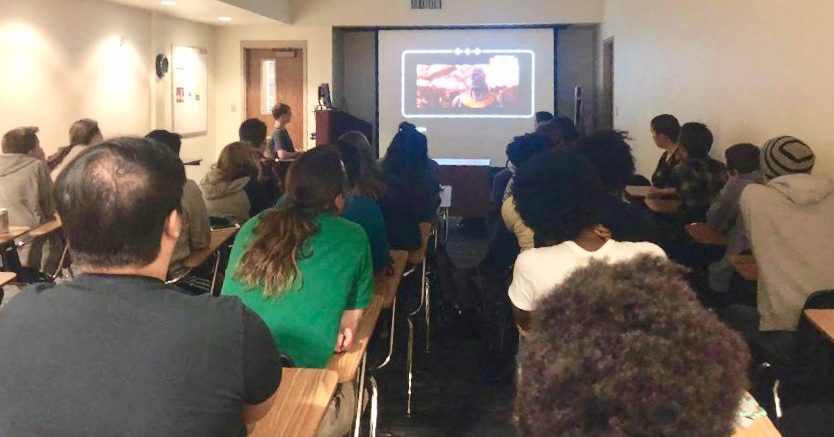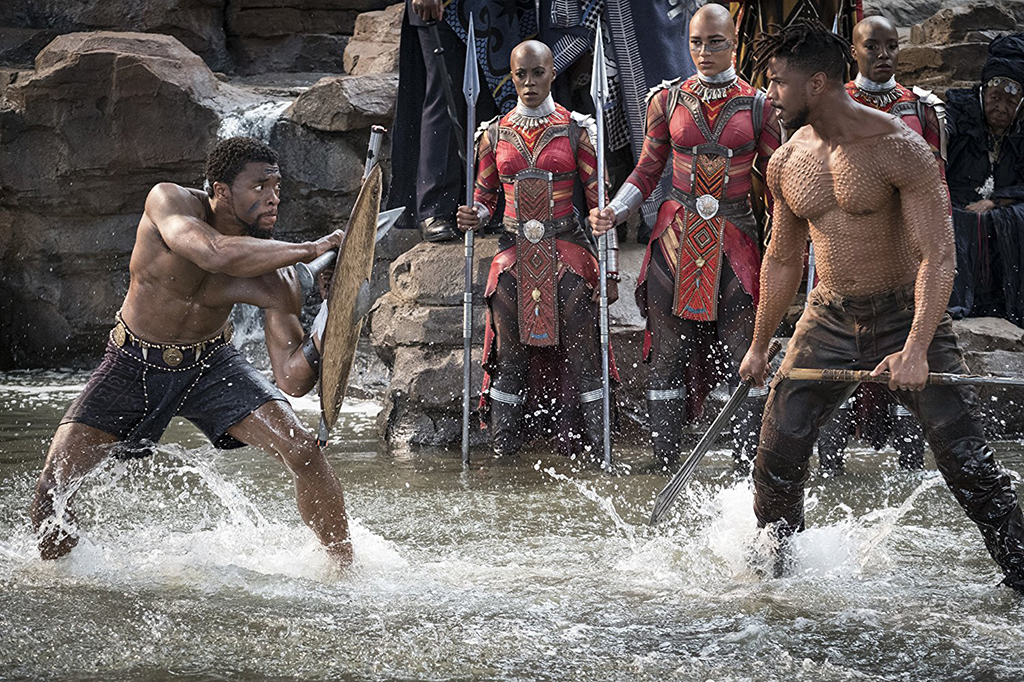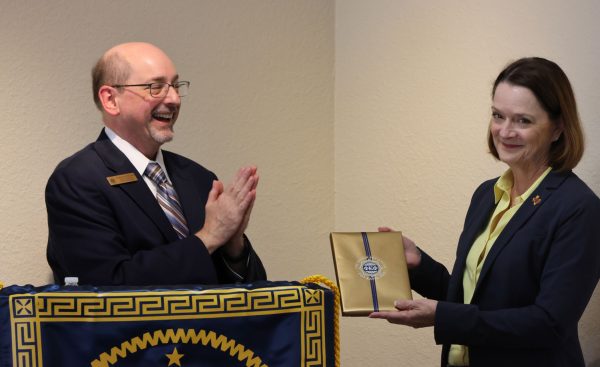Philosophy Club members discuss a modern day villain
Students watching as Nathan Conard, English junior and the president of the Philosophy Club and Nathaniel Shawver, Biology junior and vice president of the Philosophy Club present a short clip from the movie, Avengers: Infinity War. Photo by Aquila Freeney.
Students slowly filled 30 seats in Prothro-Yeager Hall on April 11, anticipating the philosophy forum about Thanos, the main antagonist for the Avengers movie, Avengers: Infinity War and continues to be in the upcoming, Avengers: Endgame.
Three overarching questions divided the forum for students to analyze and openly discuss.
Nathan Conard, English junior and president of the Philosophy Club, said, “The first topic that was discussed was, what does Thanos believe in? Second, is what Thano’s values are? The third topic was, any objections to Thanos and any ethical arguments that stand contrary to his actions.”
The multiple opposing views and philosophical thoughts about the actions and values of the specific villain Thanos inspired the discussion, and how those ideas reflect real-life scenarios.
Conard said, “The importance of these forums is that it gives more depth to the movies and topics when you understand them philosophically. It gives everyone an appreciation of philosophy as a field of study, you can see how it relates to something that is current. Even if it’s a pop culture movie, but you see physiological elements manifest itself in every aspect of your life.”
Thirty students attended the forum event to discuss their opinions over a shared interest in the release of Avengers: Endgame, on April 26.
Tyler Williams, assistant professor and faculty sponsor to the Philosophy Club, said, “Having open discussions like these is important not just because they’re fun, but also because cultivating this type of thinking has been central to the whole point of university education for centuries.”
William said he enjoyed the level and quality of participation by the students that attended the forum event.
“When we take the time to think and debate philosophical topics like morality, the meaning of life, the nature of the good, and so on, we are exercising our ability to call into question many of the assumptions that make up the world around us,” said Williams.
During each discussion, elements of Thanos’ characteristics and morals and important historical philosophers such as Immanuel Kant, Jeremy Bentham and Thomas Malthus were compared.
Williams said, “Recognizing the philosophy behind Marvel is an excellent way to highlight how philosophical ideas extend beyond the philosophy classroom. This also emphasizes how a degree in philosophy relates to the world around us since philosophy includes the ability to think, analyze, interrogate and interpret culture in general — not just philosophy texts.”
The forum discussed how these famous early philosophers all had similar ideologies. These ideologies consisted of utilitarianism, desire and pleasure, and population control.
“Talking about how Mill, Bentham and Kant relate to Marvel was, I hope, an encouragement to other students to take more philosophy classes and appreciate the type of thinking that philosophy cultivates,” Williams said.
The discussion was paused at times throughout to watch short clips from the latest Avengers movie, Avengers: Infinity War, to help students visualize the actions and characteristics that were being discussed.
Nathaniel Shawver, biology junior and vice president of the Philosophy Club, said, “It’s important to analyze the philosophy in popular action movies because they’re designed to be engaging and designate some characters as protagonists and some as antagonists. Understanding what traits are being shown as admirable or undesirable through those characters is important to think critically about what traits or ideas we cultivate in ourselves and seek out in others.”
“I hope that people came out of the forum with a desire to learn the reasoning behind others actions, despite what their first impression was. When considering people do what they do for their own reasons, most should not be immediately faulted for not doing what you would prefer,” Shawver said.










